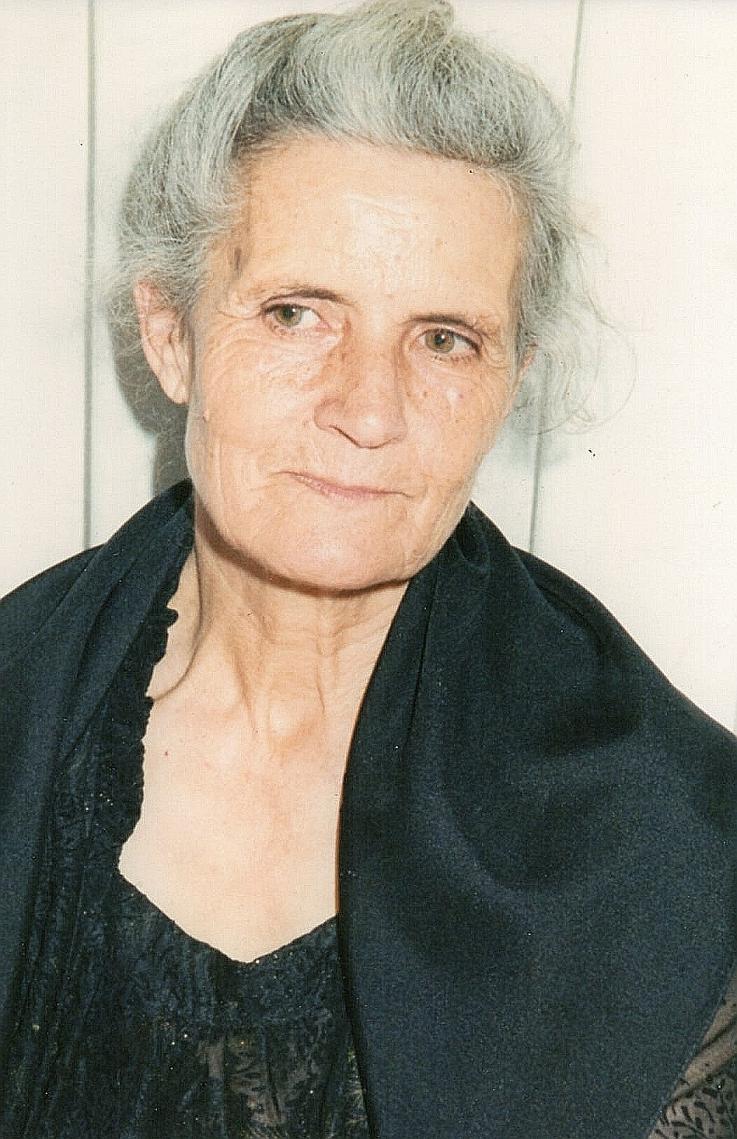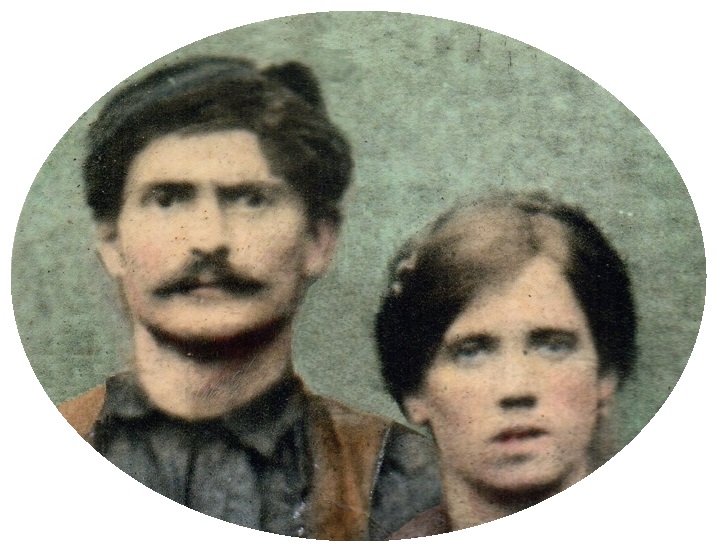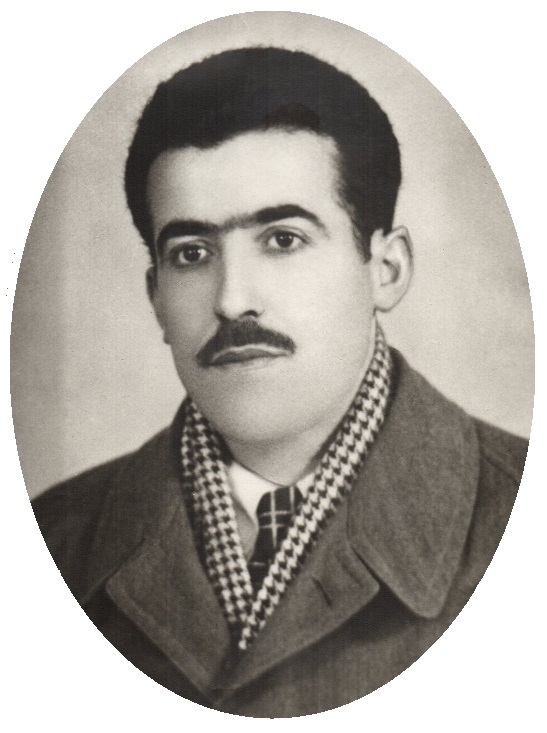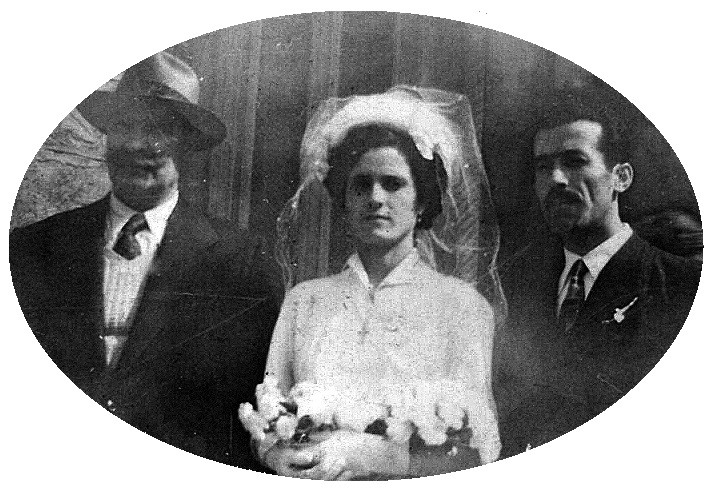Eleftheria
Pattakou (1922-2018)
******************************

She
was born in May 1922 in the
***************
Eleftheria’s father was Efthimios G. Harokopos,
from Pantanassa (a neighbouring to Patsos
village). Efthimios was a hero by all means.
(Adolescent
still, fought against the Turks in
In
Venizelos' call, he returned from America (where he had migrated) to fight as
volunteer in Metsovo Epirus (1912), initially headed
by Kleidis, and when Kleidis
was killed, led by Makris, who was also killed in a
battle three weeks later. Efthimios was proud that he
not only fought with them, but also that he was honoured with the friendship of
such great men.
In
the Battle of Crete (1941) he actively participated (among others, Efthimios handed over to the mobile hospital of Rethymno, to doctor Daskalakis,
invaluable German medical equipment he grabbed by the paratroopers).
He
actively participated in the resistance throughout the German occupation. Patrick Lee Fermor
in his book "Abducting a General", characterizes Efthimios
as a "benefactor of the Britons of

Eleftheria’s mother was
(The martyr village Gerakari,
where in August 1944 the germans,
based only
on suspicions,
executed all
the male inhabitants,
burned down
the bodies of the executed,
put
explosives and blew up all (ALL) the houses of the village (after first looting
them
with
"german" diligence and methodology).
They
also put explosives and blew up all the four churches and all the four
fountains of the village.
Among
the executed there were three “Aggelakis” (the two
were sons of her brother Astrinos (who was also
executed
by
the germans), the third was the son of her brother
(and priest) Kostis).
From
the others executed Gerakarians, many were close
relatives of
and all of them were
acquaintances and friends).
***************
Eleftheria’s parents had four
other children:
George (three years older
than her, he died in 2019),
Johanna (three years
younger, she died at a young age),
Vangelis (seven years younger,
he died in 2017),
and Amalia (ten
years younger than Eleftheria, she died in 2019).
***************
Eleftheria attended Patsos primary school for six years.
She graduated with grade
excellent (A) from the primary school in Patsos, but
despite how much she
wanted to,
she was not allowed to
go to the high school in Rethymno.
***************
During the German occupation (1941-1945), Eleftheria
was on charge of a quite significant part of the resistance her family
performed for the sake of
And this resistance had a lot
of suffering and a lot of danger.
Their home, at the
northernmost end of Patsos, was the "center of transit":
There it is where many
British, Australian and
soldiers found shelter,
food and directions for escaping to
This place is also where
groups of Greek rebels (both “left wing” and “right wing”) were stopping.
Their home was the local shelter
for the British leaders of the resistance in
her family was the one that
captain Manolis Badouvas
trusted the most.
While the men of the house had
either to hide or be absent for long periods of time, Eleftheria
was always there, restless and always in anxiety to accommodate the difficult
situations presented.
Eleftheria was tough leaving
no insult without an answer. Brave and proud, but at the same
time ready to be sacrificed for the others and for the struggle.
Too proud to accept favours, she
was not obliged to anybody; so she could “tell things as they are” to
everybody.
She held with pride the
dignity of hers and of her country, above the conquerors and above the allies.
She replied as she had to, to
the abducted German General Kreipe when he asked why
the Cretans loved the English and hated the Germans.
She refused to receive a
reward from Patrick Leigh Fermor:
What we are doing is for our
own country Greece, and not for the English, she told him.
She attacked harshly her
father (whom she loved, and who appreciated her and respected her as nobody
else) when she saw him holding the pounds of Leigh Fermor.
Like saying sadly to him: "Why, father, didn’t you refuse? Do the three
pounds of the English were so much indispensable to you?"
(Her
father when he was angry to her for something, it was sufficed to call her
"Madam Eleftheria",
and Elefteria was like “falling into the tartars”. But later,
when the “storm” was over and her father was again
calling her
with the familiar "mori Lefteria",
she was raised to heaven.)
She mislead the German soldier
in "pervola" (a field of her
family), throwing the "deadly dangerous" *** evidences in the corn
field and then "pretending" the indignant (only a few hours ago it
was when the team with the abducted German General had departed from Patsos).
(*** Why "deadly dangerous"?
Judging
from what the germans did to Gerakari,
without having some “evidence of guilt",
one can
imagine what would have happened to Patsos).
Eleftheria did a lot more, some
of which are presented at https://www.pattakon.com/gr
Eleftheria
never received a National Resistance pension.
She
was never honoured for what she offered.
She never heard a “thank you”.
Getting older she saw
injustice, dishonesty and smallness happening around her.
However Eleftheria
never stopped, until her very last breath, to truly love, and be hurt for,
***************
In 1951 she married Kostas (Konstantinos
Manousou Pattakos) from Chromonastiri, a village some 15
miles from Patsos.

The
“best man” was Captain Manolis Badouvas, who deeply
appreciated her (the first time he met her somewhere on the mountains of Patsos, listening the young Cretan girl to argue angrily
against an English leader who “dared” to challenge the culture of the Greeks,
he (Badouvas) congratulated her and asked her to be
the best man in her marriage whenever it would happen).

From 1952 until 1966 she gave
birth to:
Manousos,
She gave birth to eight
children. All of them studied Engineering
in
the
She was not allowed to be
educated, but at least she saw all her children educated.
***************
She was a very religious
woman.
Her faith made her (although
at an old age) to visit twice the holy land and take the blessing,
and to built on her
estate the chapel of St. Constantine on the mountains of her beloved village in
***************
In 1976, her mother
In 1981, her father Efthimios died.
In 1987, on October 29, her
husband Kostas died.
She and Kostas were together
for thirty-six years.
Kostas had many good
qualities.
Despite he was not rich with
all the relevant troubles, he never stopped "blessing God".
Even when he did
not have a penny in his pocket (one salary, eight kids to raise, and many
living expenses).
He never gave up.
A brave man (he fought on
1940-41 in the Albanian mountains where he lost his older brother and
co-fighter John Man. Pattakos
(whose remains were never found, and who was father of three children and of a
baby), and where Kostas came quite close to lose his legs due to frostbites).
He was a generous gentleman
(not rich, but generous and gentleman).
He helped many people who needed
his help, relatives and strangers.
Kostas died in their home in Nikaia Piraeus, and was buried in the
+
+
+
+ + +
+ + + + + + + + +
+
+
+
+
+
+
+
Eleftheria died on March 29,
2018, in the same house, leaving behind:
eight children,
four grandchildren (Anna, John, Konstantina
and Konstantinos),
two sons-in-law (George and Christos) and a daughter-in-law (Erina).
She was buried in Chromonastiri (Rethymno /
at the side of her
husband Konstantinos.
MAY
THEY REST IN PEACE